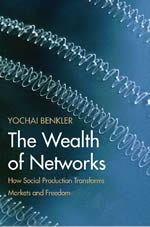Notes: Chapter 3
1. For an excellent history of the free software movement and of open-source development, see Glyn Moody, Rebel Code: Inside Linux and the Open Source Revolution (New York: Perseus Publishing, 2001).
2. Elinor Ostrom, Governing the Commons: The Evolution of Institutions for Collective Action (Cambridge: Cambridge University Press, 1990).
3. Josh Lerner and Jean Tirole, "The Scope of Open Source Licensing" (Harvard NOM working paper no. 02-42, table 1, Cambridge, MA, 2002). The figure is computed out of the data reported in this paper for the number of free software development projects that Lerner and Tirole identify as having "restrictive" or "very restrictive" licenses.
4. Netcraft, April 2004 Web Server Survey, http://news.netcraft.com/archives/web_server_survey.html.
5. Clickworkers Results: Crater Marking Activity, July 3, 2001, http://clickworkers.arc.nasa.gov/documents/crater-marking.pdf.
6. B. Kanefsky, N. G. Barlow, and V. C. Gulick, Can Distributed Volunteers Accomplish Massive Data Analysis Tasks? http://www.clickworkers.arc.nasa.gov/documents/abstract.pdf.
7. J. Giles, "Special Report: Internet Encyclopedias Go Head to Head," Nature, December 14, 2005, available at http://www.nature.com/news/2005/051212/full/438900a.html.
8. http://www.techcentralstation.com/111504A.html.
9. Yochai Benkler, "Coase's Penguin, or Linux and the Nature of the Firm," Yale Law Journal 112 (2001): 369.
10. IBM Collaborative User Experience Research Group, History Flows: Results (2003), http://www.research.ibm.com/history/results.htm
11. For the full argument, see Yochai Benkler, "Some Economics of Wireless Communications," Harvard Journal of Law and Technology 16 (2002): 25; and Yochai Benkler, "Overcoming Agoraphobia: Building the Commons of the Digitally Networked Environment," Harvard Journal of Law and Technology 11 (1998): 287. For an excellent overview of the intellectual history of this debate and a contribution to the institutional design necessary to make space for this change, see Kevin Werbach, "Supercommons: Towards a Unified Theory of Wireless Communication," Texas Law Review 82 (2004): 863. The policy implications of computationally intensive radios using wide bands were first raised by George Gilder in "The New Rule of the Wireless," Forbes ASAP, March 29, 1993, and Paul Baran, "Visions of the 21st Century Communications: Is the Shortage of Radio Spectrum for Broadband Networks of the Future a Self Made Problem?" (keynote talk transcript, 8th Annual Conference on Next Generation Networks, Washington, DC, November 9, 1994). Both statements focused on the potential abundance of spectrum, and how it renders "spectrum management" obsolete. Eli Noam was the first to point out that, even if one did not buy the idea that computationally intensive radios eliminated scarcity, they still rendered spectrum property rights obsolete, and enabled instead a fluid, dynamic, real-time market in spectrum clearance rights. See Eli Noam, "Taking the Next Step Beyond Spectrum Auctions: Open Spectrum Access," Institute of Electrical and Electronics Engineers Communications Magazine 33, no. 12 (1995): 66-73; later elaborated in Eli Noam, "Spectrum Auction: Yesterday's Heresy, Today's Orthodoxy, Tomorrow's Anachronism. Taking the Next Step to Open Spectrum Access," Journal of Law and Economics 41 (1998): 765, 778-780. The argument that equipment markets based on a spectrum commons, or free access to frequencies, could replace the role planned for markets in spectrum property rights with computationally intensive equipment and sophisticated network sharing protocols, and would likely be more efficient even assuming that scarcity persists, was made in Benkler, "Overcoming Agoraphobia." Lawrence Lessig, Code and Other Laws of Cyberspace (New York: Basic Books, 1999) and Lawrence Lessig, The Future of Ideas: The Fate of the Commons in a Connected World (New York: Random House, 2001) developed a rationale based on the innovation dynamic in support of the economic value of open wireless networks. David Reed, "Comments for FCC Spectrum Task Force on Spectrum Policy," filed with the Federal Communications Commission July 10, 2002, crystallized the technical underpinnings and limitations of the idea that spectrum can be regarded as property.
12. See Benkler, "Some Economics," 44-47. The term "cooperation gain" was developed by Reed to describe a somewhat broader concept than "diversity gain" is in multiuser information theory.
13. Spectrum Policy Task Force Report to the Commission (Federal Communications Commission, Washington, DC, 2002); Michael K. Powell, "Broadband Migration III: New Directions in Wireless Policy" (Remarks at the Silicon Flatiron Telecommunications Program, University of Colorado at Boulder, October 30, 2002).


 Yale University Press
Yale University Press